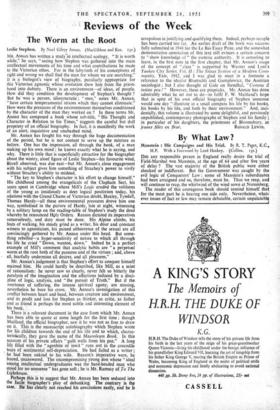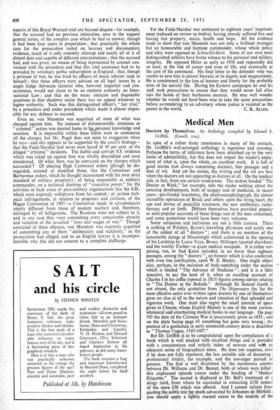By What Law?
DID any responsible person in England really desire the trial of Field-Marshal von Manstein, at the age of 64 and after five years of delay ? The vast majority of the British public were either shocked or indifferent. But the Government was caught by the evil logic of Conquerors' Law ; some of Manstein's subordinates had been arraigned and so, therefore, must he. Thus we reap, and will continue to reap, the whirlwind of the wind sown at Nuremberg.
The reader of this courageous book should remind himself that for the most part he is hearing one side only. Nevertheless, what-, ever issues of fact or law may remain debatable, certain unpalatablii aspects of this Royal Warrant trial are beyond dispute—for example, that the accused had no previous intimation, save in the vaguest general terms, of the complex case which he had to answer, though it had been four years in preparation ; that practically the -whole case for the prosecution rested on hearsay and documentary evidence, much of it only remotely relevant and nearly all of it of distant date and capable of different interpretations ; that the accused had, and was given, no means of being represented by counsel con- versant with the procedure and that this vital assistance had to be provided. by voluntary public subscription in England ; that, though a prisoner of war, he was tried by officers of much inferior rank to himself ; that those officers were advised on all legal issues by a single Judge Advocate General who, however impartial and con- scientious, would not claim to be an eminent authority on Inter- national Law ; and that on the many intricate and disputable questions in that shadowy realm there was no appeal whatever to higher authority. Such was this distinguished officer's," fair trial," by a procedure and under precedents which made it almost impos- sible for any defence to succeed.
Even so, von Manstein was acquitted of most of what was charged against him. No instance of dishonourable, atrocious or " criminal " action was sheeted home to bawersonal knowledge and sanction. It is impossible within these Emits, even to summarise all the charges, but Mr. Paget does not, seem to exaggerate when he says—and this appears to be supported by the court's findings— that the Field-Marshal had never even heard of 95 per cent, of the alleged " criminal " incidents. The feeble and corrupt S.S. evidence which was raked up against him was wholly discredited and soon abandoned. Of what, then, was he convicted on the charges which succeeded ? Of obeying High Command orders (though he dis- regarded, resisted or modified those, like the Commissar and Barbarossa orders, which he thought inconsistent with his own strict standard of military propriety) ; of being responsible as military commander, on a technical doctrine of "executive power," for the activities in back areas of para-military organisations like the S.D., which .were expressly withdrawn from his control ; of certain tech- nical infringements, in relation to primers and civilians, of the Hague Convention of 1907—a Convention made in circumstances utterly different from those of modern warfare and, therefore, Infringed by all belligerents. The Russians were not subject to it, and in any case they were committing every conceivable atrocity and violation of the so-called "laws and usages of war." Though convicted of these offences, von Manstein was expressly acquitted of committing any of them "deliberately and recklessly," as the prosecution had alleged, and to an English lawyer it is incompre- hensible why this did not amount to a complete distharge. Yet the Field-Marshal was sentenced to eighteen years' imprison- ment (reduced on review to twelve), having already suffered five and having lost property, status, health and hope. All the evidence tends to show that-von Manstein was not only a brilliant strategist but an honourable and humane commander, whose whole policy and ethic were opposed to Schrecklichkeit. Some of our own most distinguished soldiers have borne witness to his personal and military integrity. He opposed Hitler as early as 1938 and repeatedly did so later, at the risk of career and even of life, and eventually at the cost of his command. His final letter to the defender who was unable to save him is almost Socratic in its dignity and magnanimity. He is condemned to the los& of honour and liberty for the probable term of his natural life. During his Eastern campaigns he and his staff took precautions- to ensure that they would never fall alive into the hands of their barbarous enemies. He may well wonder whether he would not have been wise to take the same precautions before surrendering to an adversary whose justice is vaunted as the



































 Previous page
Previous page